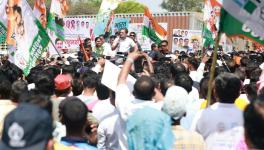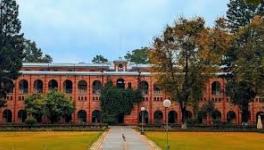Indian Muslim Un-Intelligentsia on Taliban Takeover in Afghanistan
Representational use only.
A disturbing tendency among a segment of the Indian Muslim intelligentsia has come to light since the Taliban takeover of Afghanistan. Many of them are underplaying the grim implications of the Taliban in power, even as panicked Afghans attempt to flee the beleaguered country. There is even an impulse to sympathise with the Taliban, apparent from many posts and comments on social media platforms. Their soft stance on the Taliban reflects the predisposition of a section of the Indian Muslim intelligentsia to oppress the non-elite Muslim communities and neglect their interests. The liberal and secular Muslim intelligentsia are far too silent on this issue. They must call out the conservatives and illiberal among Muslims, and the media must provide space for this.
The vulnerable sections of Muslim society have a more profound stake in a just and democratic vision of progress. For this reason, Indian opponents of Hindutva forces must set aside the paternalism and “tolerance” that often allow truants and anti-progressives among Muslims to sway public opinion. Some Muslim influencers are trying to be too clever by half, couching their sympathy in apparently modern, even anti-imperialist, arguments. For resistance against majoritarianism to regain credibility, this brand of argumentation must get questioned.
One obvious symptom that some Muslim opinion-makers are faltering in their condemnation of the Taliban is their assertion that the Taliban of 2021 is a “good Taliban”. This assumption is the basis for their dishing out governance-related dos and don’ts for the Taliban. Like preachers and pontiffs, they ignore the Taliban’s core ideology of conservatism. A Deobandi-inclined theologian associated with the All India Muslim Personal Law Board, Maulana Sajjad Nomani, has “welcomed” the Taliban in an elaborate video message. The elderly parliamentarian Shafiqur Rahman Burq has also avoided condemning the Taliban’s worldview and horrific practices.
They might rightly argue in their defence that it is the Hindu Right, which is weaponising the Taliban to target the Muslims. Yet, supporting reactionary forces even as a response to taunts is quite unacceptable. Elite Muslims certainly have the option to remain silent if they cannot unequivocally condemn the Taliban. Further, as Indian Muslims, their commitment must be to nothing less than a pluralist and inclusive governance model.
To welcome a regime that stands for a theocratic state and refuses to permit any other interpretation of Islam is hypocritical of them at best—just as hypocritical the proponents of Hindutva are, who look upon the Taliban with disdain and fear, yet choose to ignore their own role in anti-Muslim and anti-Dalit pogroms and lynching. The perpetrators of these crimes often roam free as lack of evidence lets them off in judicial trials. Nonetheless, regardless of how the Indian state deals with the situation in Afghanistan, Indian civil society must demonstrate support for an inclusive pluralist state; else, it risks losing its moral stake in Indian secularism.
No doubt, Indian Muslims face the onslaught of majoritarianism. Yet, they invoke Indian secularism and the Constitution in India and before the world to counter it. If they adopt a contrary position vis-a-vis the Taliban, they do so at their own risk. Even tactically, this is a self-defeating position, for denying the history of the Taliban hurts all those people—Muslim and Hindu—who resist majoritarianism.
The Muslim political leaders need to recall historical blunders to understand what the future could hold if this tendency continues unchecked. Millennial Muslim conservatives disguised as “minoritarians” who endorse a reactionary viewpoint must remember three past follies in particular. In the 1920s, the Hindu-Muslim unity sparked by the Khilafat movement alarmed the colonial state. What rarely gets acknowledged is it also made a section of the Hindus uncomfortable. Lala Lajpat Rai told CR Das and Madan Mohan Malaviya that the Hindus were unafraid of India’s Muslim minority, but this could change if they politically combine with their co-religionists in Afghanistan, Iraq, Turkey, and elsewhere.
The famous fiction and travelogue writer and translator Intezar Husain explains the implications of this growing sentiment in his book, “Ajmal-e-Azam” (2003). He writes that Muslim leaders of the Khilafat movement in India did not fully understand the internal affairs of Turkey, the then seat of the Khalifa or caliph. Nor did they comprehend how the institution of Khilafat had degenerated and alienated even the Turkish youth. Indian Muslim leaders, including the Oxford-educated Aligarh alumnus Mohammad Ali Jauhar (1878-1931), ignored the unsavoury facts about the Khilafat. Their denial of reality kept the Muslim masses in the dark and left them to agitate over religious issues. Sheela Reddy’s 2018 book “Mr and Mrs Jinnah” exposes the unseemly manner in which the Ali brothers conducted themselves while stoking religious feelings instead of spreading critically informed awareness.
Second, in the post-Khilafat era, the British pre-empted every possibility of Hindu-Muslim unity. At the same time, a segment of Hindus remained apprehensive about pan-Islamic concerns and sentiments of Muslims. Misleading and half-baked strategies had by now become grist to the mill of divisiveness. They contributed to the growing distance between the Hindu and Muslim communities, which eventually culminated in Partition.
Through the twenties and thirties, hardline Hindu forces worked overtime to exaggerate Hindu apprehensions that bloomed into the majoritarianism of the 1980s. The Muslim intelligentsia rarely reflects on why the Ayodhya dispute suddenly turned into an all-India Muslim issue in 1986. It prefers to cloak in silence the events that took place after the Supreme Court’s 1985 Shah Bano verdict.
In his 1988 memoir, Karwaan-e-Zindagi, Maulana Abul Hasan Ali Miyan Nadwi writes triumphantly about persuading prime minister Rajiv Gandhi to reject the proposition that many Islamic countries have reformed their personal laws for gender equity. He effectively stymied India’s first opportunity to improve Muslim personal law in favour of women. He then confesses: “Our mobilisation for protecting the Shariat in 1986 resulted into complicating the issue of Babri Masjid and vitiated the atmosphere in a big way—is ne fiza mein ishte’aal wa izteraab paida karney mein bahut bara hissa liya.”
Nicholas Nugent’s 1990 book, Rajiv Gandhi: Son of a Dynasty, substantiates this further. Nugent writes, “Ayodhya was supposed to be a package deal...a tit for tat for the Muslim women’s bill...Rajiv played a key role in carrying out the Hindu side of the package deal by such actions as arranging that pictures of Hindus worshipping at the newly unlocked shrine be shown on television.”
The lock was opened within an hour of the Faizabad district court delivering its 1 February 1986 judgement permitting the unlocking. By January 1986, Rajiv Gandhi, the Muslim clergy and Ziaur Rahman Ansari of the Momin Conference had already struck a deal. Rahman Ansari’s son, Fasihur, refers to this in his biography, Wings of Destiny, published in 2018.
To answer the nagging question—why did the administration hastily open the locks when elections were four years away, and the unlocking did not imply immediate gains to the Rajiv regime—consider French historian Laurence Gautier’s 2019 essay. Gautier elaborates on a debate over “internal” reservations that erupted in Aligarh Muslim University in 1965 to reveal the power-play among Muslim elites and its after-effects. A section of elites manipulated the reservation question into an all-India issue concerning all Muslims. The consequence was an agitation—and its attendant vicissitudes—that lasted for close to 16 years.
The third example is recent, of the Jamaat-e-Islami-e-Hind (JIH) appealing to Indian Muslims to defend Samajwadi Party leader Azam Khan’s private university in Rampur. The JIH called it a qaumi asaasa or asset of all Indian Muslims. Unfortunately, prominent opinion-makers with stakes in legal know-how have refrained from exposing the dubious legislative history of Khan’s Jauhar University. This university is no community asset but the fiefdom of a politician infamous for polarising statements. The university administration sought minority status belatedly and reluctantly, only after Khan got caught up in litigations related to grabbing land of the Muslim and Dalit peasantry to expand the campus.
In the context of these events, it hardly needs an explanation why it is essential to speak out against majoritarians of all religions and “minoritarians” who suffer from selective amnesia. The greater onus for this change is on the Muslim intelligentsia, for they forge the narratives that protect and promote their class interests at the expense of non-elite Muslim communities.
To cite another instance, some Muslim stalwarts, mainly from western Uttar Pradesh, recently welcomed RSS chief Mohan Bhagwat’s remarks that Muslims and Hindus are not different. They were reading into the speech an olive branch that does not exist. In fact, this intelligentsia is carrying forward the legacy of late-colonial India, when some had actively mobilised their co-religionists to assent to Partition. The disastrous implications of this strategy for the subcontinent hardly need explanation.
The new Muslim intelligentsia of contemporary India has an even greater duty to learn from past mistakes. However, instead of taking a course that diverges from how Israel or Pakistan have gone, we find them cooking up alibis to strengthen reactionary tendencies. For example, they insist on seeing the Taliban only as an anti-imperialist force that resisted American occupation. To be clear, colonial India also resisted British occupation. Still, it fostered an inclusive vision for its social, linguistic and ethnic groups. It also held out a vision of India opposed to imperialist powers and on the side of former colonies. The 1931 Karachi session of the Congress party and its Faizpur Agrarian Programme of 1936, besides other sessions, spelt out concrete programmes and assurances.
Even though India’s anti-colonial mass movement was the biggest in the world, it still confronts majoritarianism on a daily basis. Now consider what the Taliban could mean for the Afghans. It does not pay even lip service to social or ethnic justice, and there is no mass movement to counter its surge either. The reactionary Taliban militia mainly comprises Pashtuns who fight and rule at the expense of many other Afghan ethnicities.
That is why those Muslims whose voice can travel must assert that their stakes in the Indian Constitution and against Hindutva echo ordinary Afghans’ struggle for an inclusive, secular, just government. We will have to redefine the role of the Muslim intelligentsia before secular democracy strengthens in India. And it is primarily the stronger who can redefine their role, not the weaker sections of Muslims whom they oppress.
The author is professor, Modern and Contemporary Indian History, Aligarh Muslim University. The views are personal.
Get the latest reports & analysis with people's perspective on Protests, movements & deep analytical videos, discussions of the current affairs in your Telegram app. Subscribe to NewsClick's Telegram channel & get Real-Time updates on stories, as they get published on our website.
























